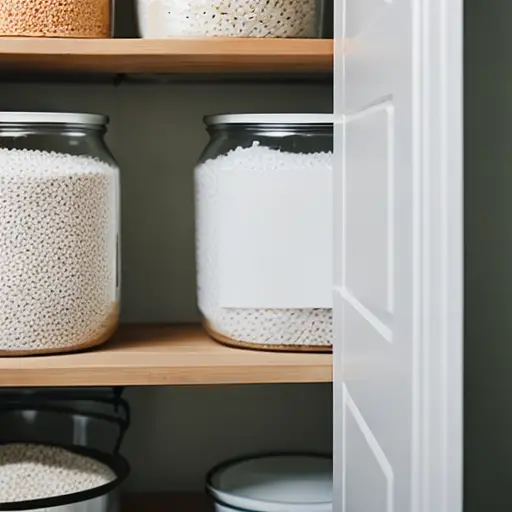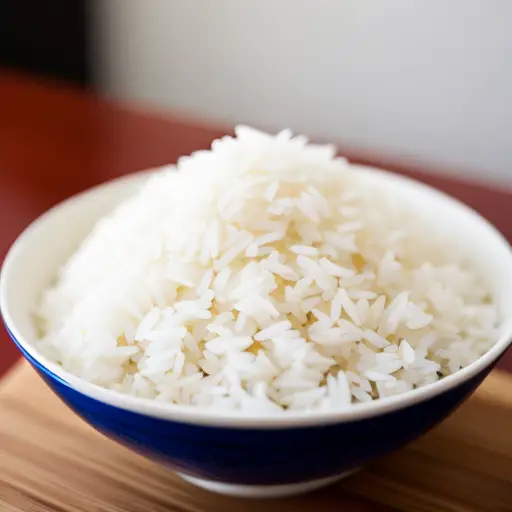
Welcome to our comprehensive guide on how long rice lasts in the pantry. Rice is a staple food consumed by people all around the world. Whether you enjoy it as a side dish, in soups, or as the main course, knowing how long rice can be safely stored is essential for maintaining its quality and taste. In this article, we will explore various factors that determine the shelf life of rice, storage tips to prolong its freshness, frequently asked questions on how long does rice last in the pantry, and also regarding rice storage. So, let’s dive in!
How Long Does Rice Last in the Pantry?
Rice, when stored properly in the pantry, can last for a considerable time. The exact shelf life depends on the type of rice and how it is stored. Here are some general guidelines:
White Rice
White rice, including jasmine, basmati, and long-grain varieties, can last for 2-3 years in the pantry when stored in airtight containers. It is important to note that the quality and taste of white rice may deteriorate over time, but it remains safe to consume as long as there are no signs of spoilage.
Brown Rice
Brown rice has a higher oil content than white rice, making it more prone to spoilage. Brown rice lasts approximately 6-12 months when stored in a cool and dry pantry. However, to extend its shelf life, it is recommended to store brown rice in the refrigerator or freezer.
Wild Rice
Wild rice is a nutritious grain with a chewy texture and nutty flavor. When stored in a cool and dry pantry, wild rice can last for about 1-2 years. Storing wild rice in airtight containers or refrigerators is advisable to maintain its quality.
Factors Affecting Rice Shelf Life

The shelf life of rice can vary depending on several factors. Understanding these factors can help you make informed decisions about storing rice in your pantry. Let’s take a look:
Packaging
The packaging of rice plays a crucial role in its shelf life. Rice that is packaged in airtight containers or sealed bags tends to have a longer shelf life as it is protected from moisture, insects, and contaminants.
Moisture
Moisture is the enemy of rice storage. Exposure to moisture can lead to the growth of mold, bacteria, and pests, reducing the quality and safety of the rice. Therefore, storing rice in a cool and dry environment is vital to prevent moisture absorption.
Temperature
The temperature of the pantry affects the shelf life of rice. Rice should be stored in a cool place with a stable temperature. Avoid storing rice near heat sources or areas prone to temperature fluctuations, such as above the stove or refrigerator.
Light
Rice should be stored away from direct sunlight or bright artificial light. Light exposure can accelerate the oxidation process and degrade the quality of rice. Keep rice containers in the dark area of the pantry, or use opaque storage containers.
Insects and Pests
Insects and pests can infest rice and cause contamination. Store rice in airtight containers to prevent infestation, or add bay leaves or dried chili peppers to repel insects naturally.
Shelf life of rice

The shelf life of rice can vary depending on the type of rice and how it is stored.
- White rice, when stored in airtight containers in a cool and dry pantry, can last for approximately 2-3 years.
- Brown rice, with its higher oil content, has a shorter shelf life and can last 6-12 months when stored in ideal conditions.
- Wild rice can last for around 1-2 years when stored properly.
It is important to note that the quality and taste of rice may deteriorate over time, but as long as there are no signs of spoilage, it remains safe to consume.
FAQs about Rice Storage
Can you freeze rice for long-term storage?
Yes, you can freeze rice for long-term storage. Freezing rice helps to maintain its quality and prevent the growth of bacteria. Cooked rice can be stored in freezer-safe containers or bags for up to 6 months. Before freezing, ensure the rice is completely cooled and divided into portions for easy use.
How can I tell if the rice has gone bad?
To determine if the rice has gone bad, look for signs of spoilage, such as a foul odor, mold growth, or insects. Additionally, visually inspect the rice for any discoloration or unusual texture. If you notice any of these signs, it’s best to discard the rice.
Can I store rice in the refrigerator?
Yes, storing rice in the refrigerator is an effective way to prolong its shelf life. Place rice in airtight containers or resealable bags before storing it in the refrigerator. Properly stored, rice can last up to 1 week in the refrigerator.
Is it safe to eat expired rice?
While rice can technically be safe to eat after the expiration date, it may not taste as good or have the desired texture. Following the expiration dates for the best quality and taste is generally recommended. If the rice shows signs of spoilage or an off smell, it is safer to discard it.
Can I store different types of rice together?
It is generally safe to store different types of rice together, but remember that stronger varieties’ flavors and aromas can permeate milder ones. Store each type of rice in separate airtight containers to avoid flavor transfer.

How can I keep insects away from stored rice?
Add bay leaves or dried chili peppers to the containers to keep insects away from stored rice. The strong aroma of these natural repellents can deter insects. Additionally, ensure the containers are tightly sealed to prevent any entry points for pests.
Does uncooked rice go off?
Uncooked rice does not go off in the sense of spoiling or becoming unsafe to eat. However, uncooked rice can lose its quality, flavor, and texture over time. Exposure to moisture, heat, and air can accelerate this process. It is best to store uncooked rice properly in a cool and dry place to maintain its optimal quality.
Does rice go off?
Rice can go off if not stored properly or contaminated with mold, bacteria, or pests. Signs that rice has gone off include a foul odor, mold growth, unusual discoloration, or the presence of insects. If you notice any of these signs, it is advisable to discard the rice to avoid any health risks.
Does rice expire?
Rice generally comes with an expiration or “best by” date on the packaging. This date indicates the estimated period during which the rice will maintain its optimal quality. While rice can still be safe to eat after expiration, it may not taste as good or have the desired texture. Following the expiration dates for the best quality and taste is recommended.
How to tell if rice is bad?
To determine if rice is bad:
- Use your senses.
- Look out for signs of spoilage, such as a foul odor, mold growth, or the presence of insects.
- Visually inspect the rice for any discoloration or unusual texture. It is best to discard if the rice appears moldy, has an off smell, or shows other signs of spoilage.
How long can you store rice dry?
When stored properly in airtight containers in a cool and dry pantry, dry rice can be stored for an extended period. White rice lasts 2-3 years, brown rice lasts 6-12 months, and wild rice lasts 1-2 years. Protecting dry rice from moisture, heat, light, and pests is essential to maintain its quality and taste.
How long does vacuum-sealed rice last?
Vacuum-sealed rice has an extended shelf life than rice stored in regular packaging. When properly vacuum-sealed and stored in a cool and dry place, white rice can last for up to 5-8 years, brown rice for 1-2 years, and wild rice for 2-3 years. Vacuum sealing helps to protect the rice from oxygen and moisture, preserving its quality for a longer duration.

How long does uncooked rice last?
Uncooked rice can last for varying periods depending on the type and storage conditions. White rice, when stored properly, can last for 2-3 years. Brown rice has a shorter shelf life of approximately 6-12 months, while wild rice can last for about 1-2 years. It is crucial to store uncooked rice in airtight containers in a cool and dry place to maintain its freshness.
Conclusion
Knowing how long rice lasts in the pantry is crucial for maintaining its quality and ensuring food safety. White rice typically lasts 2-3 years, while brown and wild rice has a shorter shelf life. Factors such as packaging, moisture, temperature, light, and pests can affect the storage life of rice.
By following proper storage practices, including using airtight containers and keeping the rice in a cool and dry pantry, you can extend the shelf life of your rice. Remember to inspect rice for signs of spoilage before consumption and discard any rice that appears moldy or has an off odor. With these guidelines, you can enjoy delicious rice dishes while minimizing food waste.
